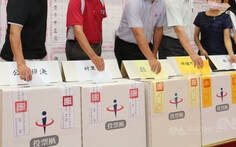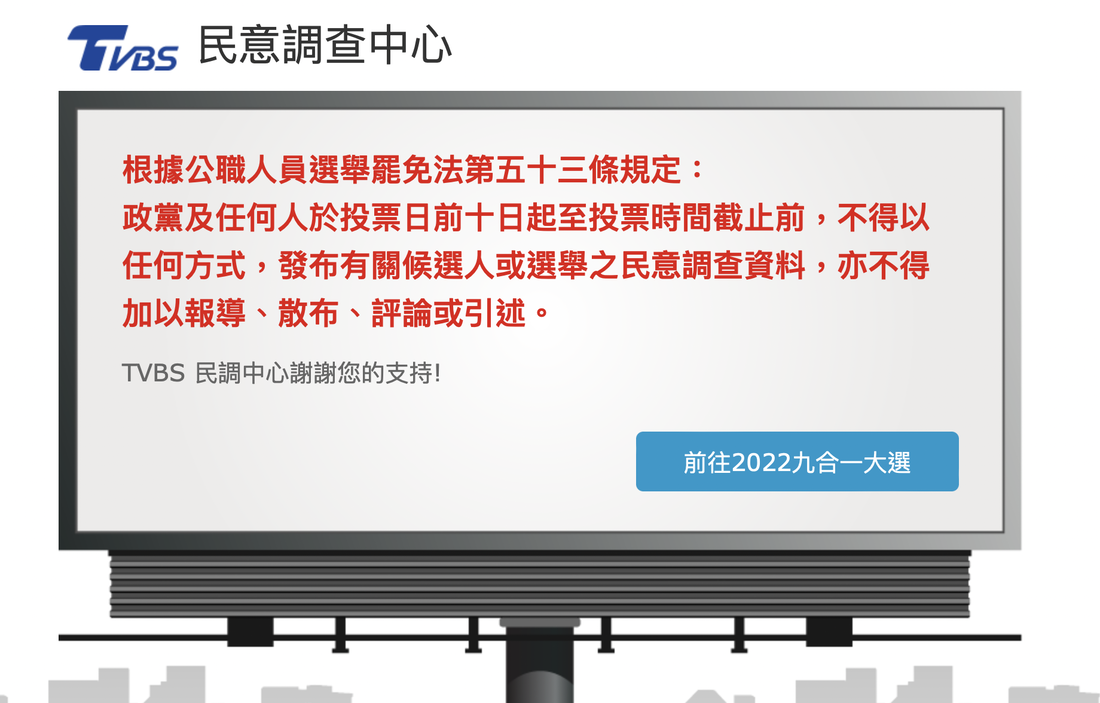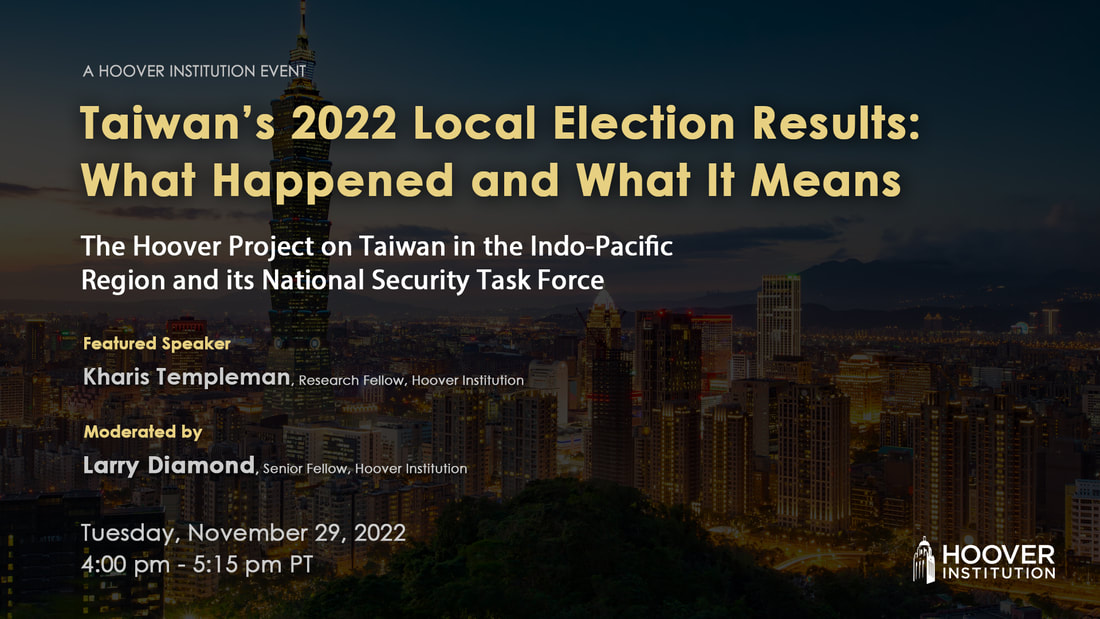As we wait for the results to roll in, I thought it would be useful to note some of the more distinctive features of Taiwan's system of election management. For readers interested in delving deeper into these issues, I have a working paper on elections in Taiwan that will come out next year in an edited book volume on electoral malpractice and manipulation in Asia. I also did a Twitter thread on the 2020 elections that may be of interest.
Five Unusual Features of Taiwan Elections

The downsides of this system are obvious: it places a disproportionate burden on people who live far from their official place of residence, including college students, active-duty military personnel, and overseas citizens. But there are advantages too: voter registration is automatic, ballot distribution and security is streamlined, and the count can take place at the polling place itself and be wrapped up quickly. (Compare with California, where we are still counting ballots for an election that happened on November 8.)
There are also historical reasons why mail-in and early voting options are viewed with skepticism by Taiwan's two major political parties. In the bad old days of martial law, ballot-stuffing was a serious problem in some races. Public vote counts, official campaign observers, and tight controls on blank ballots were developed to combat fraud, as this excellent book chapter by Su Yen-tu documents.
Unfortunately, with Taiwan still dealing with COVID quarantine restrictions, it appears that about 65,000 eligible voters will be trapped in quarantine and unable to vote. Don't blame the Central Election Commission for this: they're just following the election law, which has no provisions for alternative ways to cast a vote. Instead, blame the CECC, which has kept in place a five-day mandatory quarantine for people testing positive, and the legislature, which would need to amend the election law to allow for either early or absentee voting.
I hope the controversy here starts a more serious discussion about how to add alternative voting methods without undermining the many strengths of Taiwan's electoral process. My own view is that the current system could be adapted to allow early voting much more easily than absentee or mail. For one, early voting wouldn't necessarily require ballot transfers between different precincts, and votes could be kept on-site and counted at the same time as same-day votes. The prospect of absentee voting in Taiwan makes me very nervous: it's much more susceptible to vote-buying, and it also has the potential to completely undermine trust in election outcomes. Imagine, for instance, if a couple hundred thousand ballots cast in mainland China arrived by mail after the election, and swung several critical races toward China-friendly candidates. It would be impossible to persuade most people that those votes were cast freely, without coercion by the CCP...
2. Restrictions on campaign activities. The Civil Servants Elections and Recall Law includes a lot of restrictions on how and where candidates can campaign, what they can pass out, and even when they can officially campaign (only during the 15 days before the election for mayors and county executives, and only five for lower offices!). But in practice, the CEC is only in a position to enforce a few of these, since Taiwan's quite liberal freedom of speech and assembly protections supersede many of these restrictions.
Among the rules that the CEC still strictly enforces are limits on the value of campaign materials passed out to voters (NT$30 per item per person), the time of day campaigns can take place, (7am-10pm), and a blanket ban on campaign activities during Election Day itself, beginning at midnight. Voters cannot wear any kind of clothing with campaign insignias on it to vote, either -- including masks -- and no campaign posters or paraphernalia can be posted within 30 meters of a polling station. Voters cannot use phones or cameras to video during the voting process, either.
The ban on election-day campaigning has been extended to cyberspace as well, and the CEC takes it very seriously. In 2012, for instance, the Ma Ying-jeou Facebook page posted a simple reminder to supporters on Election Day reminding them to turn out to vote for Ma, and the CEC interpreted this as a violation of the campaign prohibition and fined the Ma campaign NT$500,000.
The election law also imposes a polling blackout during the 10 days before the election. You may have noticed all the polls on the TVBS polling site are currently down to comply with this restriction -- they'll be back up as soon as the election results are known.
Finally, if these limits seem intrusive to you, it's worth noting that Taiwan's election restrictions are in practice quite liberal when compared to South Korea, Japan, Singapore, or Malaysia, as this article by Jong-sung You details. Taiwan is a positive outlier in the region on this dimension.
3. Campaign deposits and campaign subsidies. All candidates for elected office have to pay a deposit in order to qualify for the ballot. The CEC has the discretion to set the amount, which varies by prominence of office. For 2022, the deposit requirements for candidates were:
- special municipalities: mayor - NT$1.5 million; city councilor - NT$200,000
- counties and cities: mayor - NT$200,000; councilor - NT$150,000
- township/town/city: head - NT$150,000; representative - NT$120,000
- special municipality indigenous district: head - NT$150,000; representative - NT$50,000
- village/ward chief: NT$50,000
Candidates receive a refund of this deposit only if they obtain more than 1/10 of the winner's vote share, which a lot of minor candidates do not. One of the more curious features of Taiwan elections is just how many fringe or vanity candidates are willing to spend the considerable sums necessary to qualify for the ballot with little hope of actually getting their deposits back.
Taiwan also has public subsidies for both political parties and individual candidates. Political parties get a payout every year in proportion to the share of the party vote they got in the last legislative election. Individual candidates in the local elections receive a subsidy after the election of NT$30 per vote received, but only if they obtain at least 1/3 of the winner's vote share.
These rules appear to me to strike a reasonable balance between allowing access to the ballot for serious candidates, while still discouraging completely frivolous ones. They also include several provisions that increase the value of belonging to a political party, and that tend to privilege the larger, longer-established parties over smaller ones and independent candidates -- all good things for democracy in my view.
4. What if a candidate dies? Article 30 of the Civil Servants Elections and Recall Act specifies that if a candidate dies after the registration deadline, but before Election Day, the election should be stopped and every step in the process redone with a new slate of candidates: announcement of a new Election Day, registration, drawing of ballot numbers, printing of ballots, and so forth. This actually happened in Chiayi City this election cycle: an independent candidate for mayor, Huang Shao-tsung (黃紹聰), was found dead at home, apparently of a heart attack, on November 2.
The CEC has some discretion to decide how to redo the election process, and in the Chiayi City case they decided to postpone Election Day for the mayor's race to December 18. All the rest of the elections in Chiayi City, for councilors and ward chiefs, will still be held on November 26. I'm not sure how common this solution to the death of a candidate is around the world, but it's unheard-of in the US.
5. Poll workers can be nominated by the candidates themselves. A majority of poll workers, including the head manager and supervisor, are required to be civil servants -- many of them schoolteachers. In fact, according to the Elections and Recall Law Article 59, civil servants are required to serve as poll workers if nominated. In addition, political parties and all candidates themselves can nominate some poll workers in each precinct; workers are drawn by lot when the number of nominees exceeds the required number.
This poll worker provision was introduced in the 1960s to act as a check on the ballot stuffing and fraud that frequently occurred then, and it offered candidates a way to monitor each ballot box and increase trust in the vote count. It's generally worked quite well ever since. By far the biggest threat to electoral integrity in Taiwan since the 1980s has been vote-buying, rather than fraud at the ballot box.


 RSS Feed
RSS Feed
